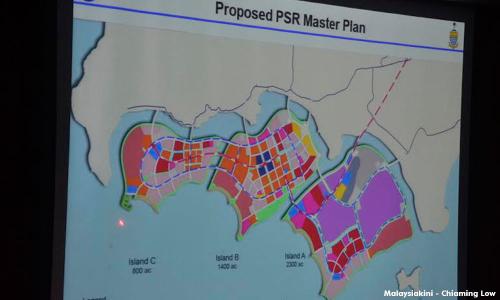Reclamation project contradicts sustainable development goals
LETTER | As the Penang state government hosts the 7th Asia Pacific Urban Forum (Apuf), concerned citizens of the island are highlighting the destruction that will be wrought by the proposed Penang South Reclamation (PSR) project, also called the "Penang South Islands", less than 10 kilometres away. The reclamation project is projected to generate 3.2 million tonnes of carbon annually and worsen Penang's already critical coastal pollution.
The push by Zuraida Kamaruddin, minister of housing and local government for more stakeholder engagement is to be lauded. However, the Persatuan Nelayan Pulau Pinang (Penang Fishermen’s Association) expresses its regret that the PSR social impact assessment (SIA) report, required by the Town and Country Planning Act (TCPA), was approved on May 17, 2019, even though most fishermen in the impacted area were never informed or consulted about the SIA.
The PSR Project clearly goes against Malaysia and Penang’s climate pledges (SDG13) and aspirations to achieve the UNDP’s Sustainable Development Goals, especially
• SDG1 (no poverty)
• SDG8 (decent jobs and economic growth)
• SDG10 (reduced inequalities)
• SDG11 (sustainable cities and communities)
• SDG13 (climate action)
• SDG 14 (life below water), namely, “Conservation and sustainable use of the oceans, seas and marine resources for sustainable development”.
The lack of transparency has been a defining feature of the massive PSR project, which will create three artificial islands of 4,500 acres (larger than Forest City). The minister for agriculture and agro-based industries has acknowledged that the PSR project will affect the lives of 5,000 Penang fishermen and 2,300 Perak fishermen, though other sources have put the latter figure as high as 6,000.
Affected communities and civil society advocates have pointed out how members of the Penang state government often look condescendingly upon fishermen and do not protect their rights. They urge the country's leaders to embrace a vision of a sustainable and inclusive city that is supported by the New Urban Agenda.
The UN-Habitat’s New Urban Agenda and the UNDP’s SDGs must not be mere tokenisms uttered at international conferences but must require UN agencies and state parties to commit to actual engagement with stakeholders. The PSR project goes against the principles of socio-economic inclusivity:
- The PSR project will cause many fishermen to become unemployed, hence depriving them of "decent work" (SDG8).
- The planned resort-like real estate on the reclaimed artificial islands does not benefit local people who cannot afford to live there.
- The implementation of the PSR project will put pressure, destabilise and displace existing communities in Penang Island South (SDG11).
- PSR is likely to result in significant decline in local fisheries which will affect the fishermen’s families directly, and also jeopardise the food security and nutrition of low-income families (SDG2).
- The PSR project will increase the gap between rich and poor and will disadvantage the bottom 40 percent low-income population, for all the above reasons (SDG10).
The Penang Fishermen's Association has repeatedly voiced their objections since 2015, with a demonstration by 1,500 fishermen and a protest at sea in 2017 with 450 fishing boats. However, the Penang government continues to deny the fishermen's right to livelihood in favour of this project.
Two petitions related to this protest have been signed by 240,000 supporters. The number clearly demonstrates the groundswell of support for these fishermen and the concern that the PSR project will likely result in a total destruction of the coastal and marine ecosystem (SDG14), including the richest fisheries in Penang-northern Perak waters, natural beaches with endangered turtle landing sites, marine mammals, coral reefs, mudflats and mangroves.
The importance of small-scale fisheries sector has been recognised by the UN Food Administration Organisation (FAO). Small-scale fisheries should be maintained due to their sustainable practices and their efficient delivery of protein and nutrients to the B40 through close ties with these communities. In times of global warming and declining global fisheries resources, these coastal fishermen contribute significantly to food security strategies for the future.
Furthermore, it should be pointed out that the reclamation poses a threat to the Penang-northern Perak billion-ringgit marine aquaculture industry which accounts for half or more than half the tonnage and wholesale value within Peninsular Malaysia. The aquaculture centres in this area are also the main suppliers of fresh fish to Singapore and live garoupa to Hong Kong.
The Persatuan Nelayan Pulau Pinang today presented a memorandum to a representative of UN-Habitat on behalf of the affected coastal fishing communities. Also present at the Asia-Pacific Urban Forum were members of Penang Forum and other concerned NGOs who are a part of the Penang Tolak Tambak Coalition as well as representatives of Jakarta Tolak Reklamasi Coalition.
Participants from all around the world who are concerned with sustainability, inclusivity and climate change congregating at the 7th Apuf are asked to support the call by Penang Tolak Tambak to cancel the PSR project. The Penang state government is in a special position to remedy this major environmental transgression by cancelling the PSR project now.
The views expressed here are those of the author/contributor and do not necessarily represent the views of Malaysiakini.
RM12.50 / month
- Unlimited access to award-winning journalism
- Comment and share your opinions on all our articles
- Gift interesting stories to your friends
- Tax deductable
